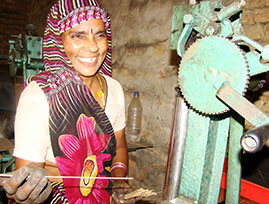“Incense is deeply embedded in Indian culture and religious traditions,�? says ASI Program Manager Amit K. Singh.
|
Innovative Technologies in Incense Stick Production Benefit Women(ASI)’s Mark Sevier and Amit Singh recently ceremonially ignited an agarbatti (incense stick), officially inaugurating an enterprise partnership between private incense companies and the Mahila Gram Udhoyg Vikas Sansthan women’s federation in Agra, India. The partnership was formed with support from ASI’s Sunhara Walmart project. The agarbatti activity, an example of public-private community partnership, will bring gainful employment in incense stick production to underemployed local women and introduce time-saving equipment. Prominent guests at the ceremony included the subdistrict magistrate, the CEO of Rajasthan Perfumeries, representatives from three financial institutions and other stakeholders. Over 70 women celebrated the event, joined by dozens of men, many of them husbands of the women involved who are starting to become more supportive of the federation, its empowerment activities and the economic opportunities available. Incense a Rich TraditionIndia’s rich tradition of incense making goes back millennia, and the agarbatti market in India is vibrant. “Incense is deeply embedded in Indian culture and religious traditions,�? says ASI Program Manager Amit K. Singh. “For example, Hindus will not touch incense sticks if they are unclean (from having come in contact with meat, etc.), and many Indians believe there is a positive, highly spiritual nature to the fragrance that permeates the air as incense burns away to ashes.�? Innovations, Investment and CollaborationAgarbatti production is often done by hand-rolling incense sticks, which is time-intensive for women and constrains production volumes and quality consistency. When ASI began its work in this market in 2009, the pedal machines available on the market were costly, bulky and required extreme exertion to push the sticks through the machine. During ASI’s initial market research, a more appropriate pedal-powered machine was discovered in Vietnam. Staff worked to transfer and adapt this design for the Indian market, and now a local fabricator produces it in Agra supported by a $40,000 investment by Divinity Industries to ensure the availability of raw materials throughout the year. In addition to improving the durability of the machine by using metal instead of wood, ASI’s design adjusted the amount of pressure needed to apply to the pedal and thus reduce energy expended on producing raw agarbatti. This makes the machine more easily used by women and also increases productivity. This new, locally fabricated pedal machine has been instrumental in the success of the agarbatti activity in Agra and has brought down costs by 30 percent. After demonstrating the cost and time efficiencies of the federation’s agarbatti production system, ASI facilitated additional private sector investment and direct market linkages with ITC Ltd., India’s largest incense stick exporter, and Rajasthan Perfumeries, one of the largest brands in northern India. Rajasthan Perfumeries, which now has an MOU with the federation, invested $55,000 to purchase 50 pedal machines; 25 have already been installed with the remainder to be installed in December. Pleased with the initial success, the company is also moving forward with plans to install a raw material mixing unit on-site at the federation, which will further increase employment and value capture for these women. ASI incurred only minimal expenses associated with initial technical training and support to establish the federation. Effective Poverty ReductionAlready this is perceived to be one of the most effective poverty-reduction programs in Agra. Before ASI introduced this enterprise opportunity, most of the women now involved in agarbatti production were landless laborers, who lacked control over family income and were dependent on seasonal labor demand. Now, women are able to earn $3 a day on average—seven times more than they made as laborers, and investors can see a 30 percent return on investment in seven months. “Agarbatti has changed our life. We never imagined that we could become the breadwinner for our family,�? says Nilim, secretary of the federation. The Mahila Gram Udhoyg Vikas Sansthan women’s federation is composed of 126 self-help groups engaging over 1,500 women in an integrated model of social and economic empowerment. These women now have access to more stable, profitable livelihoods through improved agarbatti technologies, bargaining power and aggregation via the federation, linkages to buyers, and investment in and enhancements by the private sector. 'Tremendous Potential'ASI’s Sevier, visiting from Washington, D.C., said, “This is one of the most socially conservative areas of India, and the business model has tremendous potential. The investment and engagement by the private sector in this Agra-based federation is remarkable—an aspect that will help ensure the sustainability of the economic benefits achieved to date.�?
|


